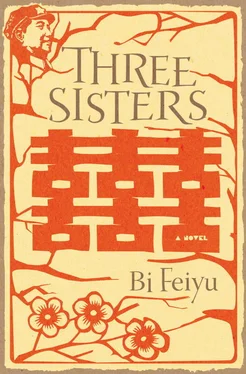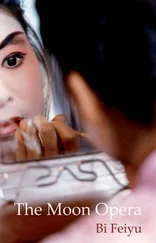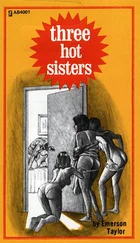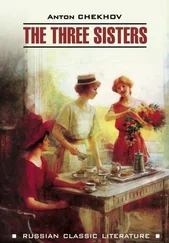“This is to be a Spring Festival that stands for solidarity, vigilance, solemnity, and vivacity,” Wang barked into the microphone, his words like the gleaming exclamation-mark switches he pressed while he spoke: vigilant and solemn, adding a harsh and mighty aura to the cold winds of winter.
With an old overcoat draped over his shoulders and half a Flying Horse cigarette between his fingers, Wang Lianfang went on a holiday inspection of the village on the second day of the new year—a raw, cold day. The lanes and alleys were virtually deserted, with only a few old men and children out, a dreary sight for such an important holiday. Obviously, the younger men had gathered at some secret spot to try their luck at cards. Wang stopped in front of Wang Youqing’s door, where he coughed a time or two and spat out a glob of phlegm. The window curtain parted slowly to reveal the red padded jacket of Wang Youqing’s wife. She glanced at the lane entrance and gestured toward her gate. The house was too dimly lit and her hand had moved too fast for Wang Lianfang to know what that gesture meant, but he turned to look just as the PA system came to life, carrying the voice of his mother, whose shouts were garbled by several missing teeth and a sense of urgency: “Lianfang, hey, Lianfang. It’s a boy. Come home!”
It took Wang Lianfang, who was still looking toward the lane entrance, a few minutes to comprehend what he was hearing. When he turned back to the red jacket in the window, Youqing’s wife, her face resting against the sill, was gazing at him impassively, her shoulders slumped. He thought he saw a trace of resentment on her bewitching face, which was framed by the stand-up collars of her jacket as if it were cupped in the palms of her hands. From the clamorous background emerging from the loudspeaker, Wang could tell that his living room was swarming with people. Someone put on a record, which filled the village with the valiant, sonorous, and rhythmic strains of “The Helmsman Guides the Ocean Journey.”
“Go on home, you,” Youqing’s wife said. “They’re waiting for you.”
Shrugging the old overcoat up over his shoulders, Wang laughed and muttered to himself, “Well, I’ll be damned.”
Yumi ran in and out of the house, her sleeves rolled up to expose arms that had turned purple from the cold. But her cheeks were fiery red, generating an irrepressible glow, a sign that she was trying to suppress both an excitement and a shyness of unknown origin. The strain of mixed emotions had turned her face smooth and shiny. She bit her lip the whole time she was running around, as if she, not her mother, had delivered Little Eight. At long last her mother had a boy, and Yumi could breathe a heartfelt sigh of relief. Happiness took root in her heart. As eldest daughter, Yumi was, for all intents and purposes, more like a sister to her mother. In fact, she had assisted the midwife in the birth of the sixth girl, Yumiao, since certain things were too awkward for an outsider to handle. The arrival of Little Eight constituted the third time she’d watched her mother give birth, and that made her privy to all of a woman’s secrets, a special reward for being the eldest. The second sister, Yusui, was only a year younger than Yumi, and the third girl, Yuxiu, two and a half years. But neither of them could match Yumi’s understanding of the ways of the world or her level of shrewdness. Age among siblings often represents more than just the order of birth; it can also signal differences in the depth and breadth of life experience. Ultimately, maturity requires opportunity; the pace of growth does not rely on the progression of time alone.
Yumi was outside dumping bloody water in the ditch when her father walked through the gate. He assumed that on such a happy occasion his daughter would say something to him or at least glance his way. But she didn’t. She wore only a thin knit top that, because it was a bit on the small side, showed off her full breasts and thin waist. Wang was surprised at the sight of her curves and purple arms; Yumi had grown into a woman.
Yumi normally did not speak to her father, not a word, and he figured that had something to do with what went on between him and other women. Sure, he slept around, but his wife didn’t seem to mind; she even continued to be friendly with those women, some of whom still called her Sister Guifang. But not Yumi. Though she never talked about it openly, she had her way of dealing with the women, something that Wang Lianfang learned later during a little pillow talk. Zhang Fuguang’s wife was the first to let on, several years back, when she was a newlywed. “Yumi knows,” she said, “so we have to be careful.”
“She doesn’t know shit,” Wang replied. “She’s just a kid.”
“She knows. I’m sure of it.”
It was not something Fuguang’s wife had dreamed up. A few days before, she had been sitting under a locust tree with some other women sewing a shoe sole when Yumi walked up. Fuguang’s wife’s face reddened as soon as she spotted Yumi, and, after a quick glance, she looked away to avoid the girl’s eyes. But when she stole another glance, she realized that Yumi was standing in front of her, staring holes in her. Totally calm, totally composed, Yumi sized her up from head to toe and back as if they were the only two people present. Since she was only fourteen at the time, Wang Lianfang refused to believe she knew anything.
But then a few months later, Wang Daren’s wife gave Wang Lianfang a real scare. He had barely climbed on top when she covered her face with her arms and arched upward as if her life depended on it. “Party Secretary, work hard and get it over with quickly.” Unsettled by her plea, he did finish quickly—too quickly. After which Wang Daren’s wife hurriedly cleaned herself without a word. Wang cupped her chin and asked what was wrong. She fell to her knees.
“Yumi will be here any minute to play shuttlecock,” she said. Wang blinked nervously; now he believed the rumors. But back at home he saw innocence in his daughter’s face, and he knew this was a subject he could not bring up. That was the day Yumi had stopped talking to her father, and that hadn’t bothered him—you can’t stop sleeping just because there’s a mosquito in the room. But now that Wang finally had his precious son, Yumi quietly made her existence and its significance known to him; it was an unmistakable signal that she had grown up.
Wang Lianfang’s mother’s lower lip quivered, her arms hung down at her sides. She was so old she could not control her slack lower lip. For women her age, unexpected happy events like this were sheer torture, for they were incapable of showing emotions on faces that seemed forever stiff. Wang’s father, on the other hand, was handling it all quite well, having settled on a dispassionate response. He just puffed slowly on his pipe. He was, after all, the former director of security, a man who had seen a thing or two and knew how to keep his cool, even during happy moments.
“You’re back,” his father said.
“I’m back.”
“Well, pick a name.”
Having thought about this on the way home, Wang was prepared. “He’s the eighth child, so we’ll call him Wang Balu.”
“Balu, as in ‘Eighth Route Army’? Sounds fine,” the old man said. “But ‘Wang’ and ‘ba’ together mean ‘cuckold.’”
“All right then, we’ll call him Wang Hongbing, ‘Red Army’ Wang.”
The old man said nothing more, typical of a head of household in the old days. They showed approval by silence.
The midwife called for Yumi, so she laid down the basin and hurried into her mother’s bedroom. Wang saw that she’d learned to hold her arms close to her body as she ran, although her braids swung briskly across her back. Over the years, he’d been so focused on fooling around and spreading his seed that he hadn’t paid enough attention to Yumi, who had, it was clear, reached marriageable age.
Читать дальше











